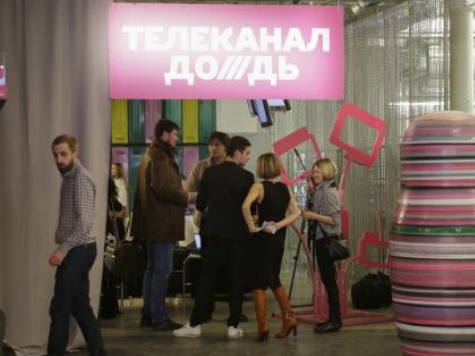More independent media in Russia face outages due to their unwillingness to toe the Kremlin line. Independent station Rain TV (TV Dozhd) lost its first office in January and was kicked out of its second office over the weekend. The station now broadcasts out of an apartment in Moscow.
A picture of the teleprompter that said “Good morning” in the flat circulated around social media. Natalya Sindeyeva, the station’s managing director, said the flat is the station’s home for the time being. She did not elaborate or provide a time frame of Rain TV’s next moventment.
Rain TV moved into Snob Magazine’s headquarters at the Krasny Oktyabr business center in Moscow in the beginning of 2014. The magazine did not own a rental contract with Rain TV, but wanted to help out until the station found a permanent office. Time ran out.
“We helped Rain as best we could but we also need to relaunch projects, therefore we asked them to move out,” said Marina Gevorkyan, Snob’s managing director.
Rain first went off the air in January after they ran a controversial poll about Stalingrad. It asked people if the Russians should have surrendered the city “to the Nazis in World War Two to save lives.” The poll was deleted, but carriers dropped Rain TV in protest. Rain shut down after Trikolor, the last carrier to hold on, dropped them. It went to online broadcasting with a fee of $28.
The station shot to fame in 2011 with their coverage of the anti-government protests in Moscow. Ever since then, fans of Russian President Vladimir Putin pushed to shut down the station because they dare to offer a view that contradicts the Kremlin.
TV2, another independent station, is also on the verge of closure. Based in Tomsk, Siberia, the station could shut down at the end of the month because the Russian Radio and Television Broadcasting Network (RTRS) does not want to renew the contract. However, Russia’s media regulator Roskomnadzor told TV2 their contract “would be extended for another 10 years, meaning there are no legal grounds to cancel its transmission contract.”
“We shall challenge the decision of RTRS to terminate out contract in the courts,” said Viktor Muchnik, TV2’s general director. “If it is so simple to take us off the air, without any formalities, then tomorrow it will be possible to break anyone.”
Putin cracked down on media escalated after Ukraine’s Russia-backed President Viktor Yanukovych was ousted on February 22. Moscow shut down three news websites critical of the Kremlin and the blog of longtime opposition leader Alexei Navalny. On March 12, Lenta.ru’s chief editor Galina Timchenko resigned, but employees said she was fired because she defied the Kremlin and published an interview that quoted the Right Sector Party’s leader. Moscow identifies the group as extremist and a threat to Russia. The next day many employees resigned in protest of her firing and censorship efforts from Moscow. Kommersant reporter Anastasia Karimova posted her resignation letter on Facebook and Instagram. She left because of censorship and said there is no acceptable work in Moscow for journalists.
Kommersant Ukraine was shut down by its Russian publisher due to lack of funds, but a source told The Kyiv Post it was over censorship. In April, the US accused Russia of censorship when Moscow shut down Voice of America.
On May 6, Putin passed a law that outlaws profanity in the arts. This law is as vague as the newest law and does not define exactly what is considered profane, but if one is found guilty, he or she could be fined. The language law echoes an essay by Leon Trotsky, a Marxist revolutionary, called “The Struggle for Cultured Speech.”
In July, Putin signed a law that says people could receive a prison sentence for supporting extremist activities online. The “activities” are not specified in the law, which means the law could be interpreted to range from terrorism to disagreeing with the current regime. The Moscow Times said Professor Vyacheslav Dmitriyev was arrested “for reposting an article about a theoretical coup d’etat on a social network.”

COMMENTS
Please let us know if you're having issues with commenting.